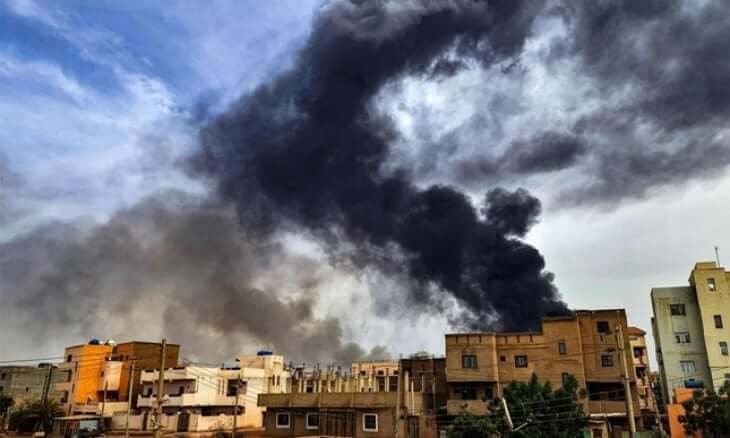UN Report: Planes Disappear from Radars After Taking Off from UAE and Reappear in Chad

Sudan Events – Agencies
The British newspaper The Guardian published a report timed with the “London Conference” on Sudan (Tuesday), predicting its potential failure. It stated that the UK found itself in a highly awkward position after inviting the UAE to participate in the conference, as the Emirates is considered the main suspect in supporting the militia that has been fighting the Sudanese army.
The situation worsened a day before the conference when the world was shocked by the militia’s deadly attacks on displaced civilians’ camps in Zamzam, around El Fasher, and in Umm Kadada. The massacre left at least 400 dead, including children, women, and humanitarian workers.
According to Al-Muhaqiq news site, citing The Guardian, there are persistent accusations against the UAE for supplying weapons to the militia. Suspicion also surrounds the weaponry used in the Zamzam massacre in Darfur, allegedly provided by the UAE—the very country invited to the conference—putting further pressure on the event’s organizers.
The newspaper further revealed details from a United Nations expert report indicating evidence that large military transport planes took off from the UAE and landed in Chad, suggesting a possible arms airlift. From Chad, these weapons are believed to have been transported into Darfur.
Despite The Guardian’s adherence to journalistic fairness by reaching out to the UAE for comment—which strongly denied the accusations—the adage “the guilty deny” rings true here. There’s no greater shame than arming a rebel group responsible for killing 400 civilians in a single day, then claiming to be aiding them with humanitarian relief.
The Guardian noted that it had reviewed a highly classified internal UN report detailing multiple UAE flights that appeared to intentionally avoid radar detection while flying to bases in Chad. From there, weapons were reportedly smuggled across the border into Sudan.
The report raises serious questions for British Foreign Secretary David Lammy, who controversially invited the UAE—along with 19 other countries—to peace talks in Sudan at Lancaster House on April 15. That date marked the second anniversary of the war, which has created the world’s worst humanitarian crisis, displacing over 12 million people.
A “senior diplomat” familiar with the leaked report, speaking anonymously, told the newspaper:
“The UK must explain how it justifies hosting the UAE while massacres of children and aid workers continue.”
The 14-page report, finalized last November and sent to the UN Security Council’s Sudan Sanctions Committee (established under Resolution 1591 in 2005), was prepared by a five-member UN expert team. They documented a consistent pattern of Ilyushin Il-76TD cargo flights from the UAE to Chad. At least three possible land routes were identified for weapons transfer into neighboring Sudan.
The cargo flights were reportedly so regular that they established a “new regional air bridge.” The flights displayed suspicious characteristics, often vanishing from radar over “key geographic areas,” which the experts said raised concerns about potential covert operations.
Despite these indicators, the experts clarified they couldn’t determine the contents of the planes or conclusively prove they carried weapons.
In a surprising omission, The Guardian observed that many of these suspicious flights were not mentioned in the UN experts’ final 39-page report—due to be released soon—except for a brief note related to peace talks. No explicit reference to the UAE appeared in the final version.
The article noted that questions about the UAE’s alleged support for the RSF arose just after a weekend massacre in which RSF militia members killed more than 200 civilians, primarily from vulnerable ethnic groups in IDP camps and around El Fasher—the last major city in Darfur under Sudanese army control.
The diplomat told the paper:
“It would be shameful if the conference fails to provide concrete protection for civilians amid ongoing genocide.”
In January, the United States officially declared that the RSF had committed acts of genocide in Sudan. Yet, the UAE continues to claim it is committed to achieving “lasting peace” in Sudan.
In a UN briefing last November, experts investigating possible arms smuggling from Chad to Darfur—potentially violating the arms embargo—identified at least 24 Ilyushin Il-76TD cargo flights landing at Umm Jars Airport in Chad in the past year. These flights coincided with escalations in fighting around El Fasher and notably with increased use of drones by the RSF for combat and intelligence, signaling, experts said, a “new technological phase” in the conflict.
Some flights were operated by entities previously linked to illicit arms transport and military logistics. Two of them had already been reported for violating the arms embargo. The experts also examined routine departures from UAE airports in Ras Al Khaimah and Al Ain (Abu Dhabi), noting that the aircraft frequently disappeared from radar during key segments of their flights.
In one case, a plane reportedly departed from Ras Al Khaimah, vanished mid-flight, then reappeared in N’Djamena, Chad, before returning to Abu Dhabi. However, the experts emphasized they could not definitively prove the planes were carrying weapons due to the lack of concrete evidence on the cargo.
Four of the five UN experts acknowledged that, although the flight patterns marked a “notable new trend,” the findings failed to meet the evidentiary threshold to conclusively demonstrate arms transfers. For example, while residents of Nyala reported sightings of cargo aircraft and linked them to RSF operations, there was insufficient corroborating evidence to confirm the nature of the cargo.
Thus, the experts concluded that “it is too early to determine whether these flights are part of an arms smuggling network.” They also stated that many of the aircraft and operators’ past links to illicit arms and military logistics “do not constitute proof of current arms transfers.”
They added:
“Moreover, flight anomalies such as radar disappearance and unregistered takeoffs raised suspicions but did not provide definitive evidence linking the flights directly to weapons shipments.”
Closing those investigative gaps, they noted, remains a critical task.
(Reported by Al-Muhaqiq News Site)



